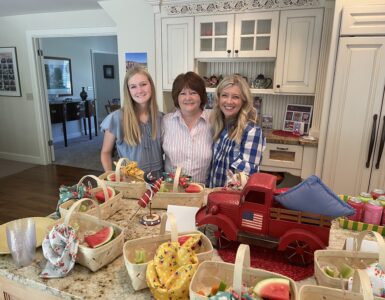Women are masters of kinkeeping.
It requires effort (and lots of it!) to keep a family connected, happy, and healthy. All that effort has a name. It’s called kinkeeping.
The New York Times defines kinkeeping as “creating or carrying on family traditions, buying gifts for birthdays and holidays, coordinating medical care and performing all sorts of emotional caregiving. It’s a form of invisible labor, predominately done by women, dedicated to family bonding and magic-making.”
Don’t you feel seen and validated reading that definition? It is invisible labor after all. Labor that oftentimes goes unnoticed, but women do it anyway, and so well.
Studio 5 Parenting Contributor Heather Johnson shared why kinkeeping is so important.
“Who doesn’t want to be a kinkeeper and help connect generations and keep the stability that comes with it?” Heather said.
“It is, it is so beautiful to consider that we’re giving it a name. It is a hard job. It takes consistent effort and stamina, and yet women continue holiday after holiday, year after year, Sunday dinner after Sunday dinner to put it forward, even when they sometimes don’t feel recognized.”
The Magic of Small Things
Kinkeeping is about more than making sure that Christmas looks a certain way, Heather explained. It’s about the small things, like making a phone call to each of the siblings once a month to connect them or sending birthday texts. It’s these little, tiny things that make a big difference.
“It’s so amazing to see the benefits that come to families who are filled with kin keepers,” she said.
The Family Glue
Danielle Friedman, journalist for the New York Times, describes a kinkeeper as someone who, in many ways, is the family glue. Heather agreed, “You’re creating genuine connection. You are entangled with one another in the coolest of ways.”
The Power of Predictability
Another benefit of kinkeeping is predictability. Kids know what’s going to happen at Christmas. Kids know they’re going to get a call from grandma on their birthday. Predictability helps kids feel safe.
“May I say, in the face of a world that is completely unpredictable, to feel that safety inside this family connection unit, that’s amazing. It means everything,” Heather said.
A Thankless Job
Despite the benefits, kinkeeping is often a thankless job. In one viral TikTok post describing kinkeeping, creator Molly Westcott compared it to a play.
“Women are the production crew. They’re the ushers and everyone else working off stage. There’s a lot of effort and time and energy that goes into a play, but at the end of the day when the play is done, people are not clapping for everything they did not see.”
The Privilege of Kinkeeping
Despite the challenges, kinkeeping is a privilege. “It means that we’ve been given the talents and the skills and the abilities,” Heather explained, “It means that we have essentially a testimony of the power behind kinkeeping. That’s a pretty beautiful thing when we look at it that way.”
“Think about what’s at stake. The quality of your relationships is built in these small moments.” – Eve Rodsky, Writer & Researcher
Read the New York Times’ full article on kinkeeping.
To contact Heather for counseling, email blog.familyvolley@gmail.com, or visit www.familyvolley.blogspot.com.















Add comment